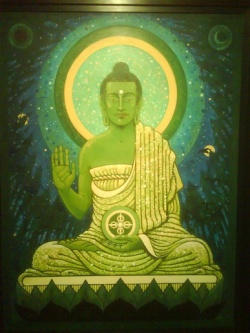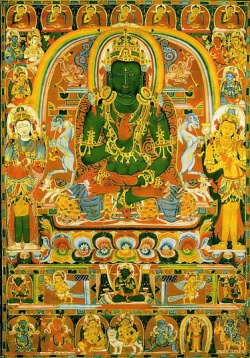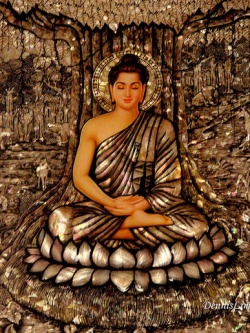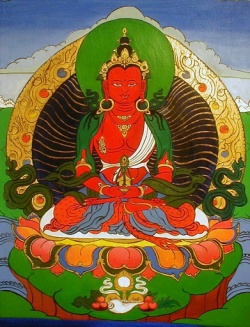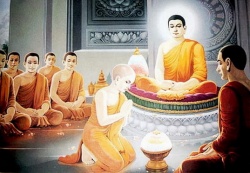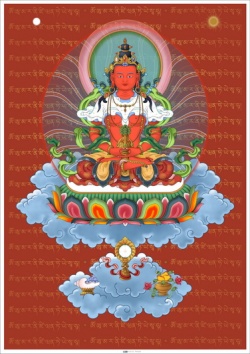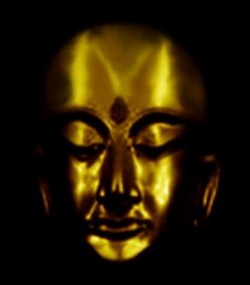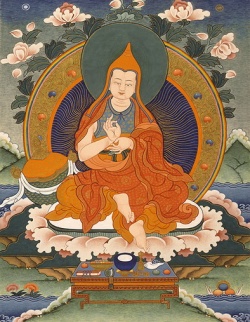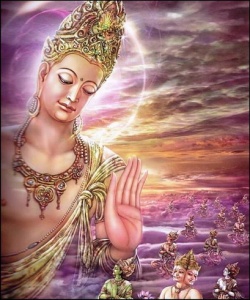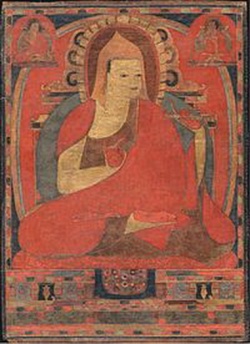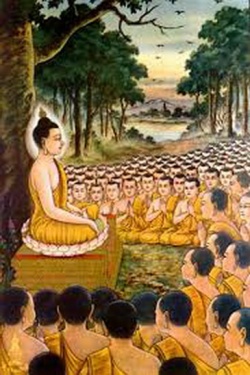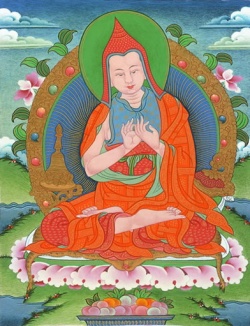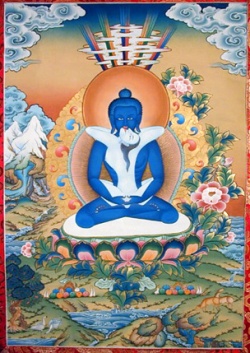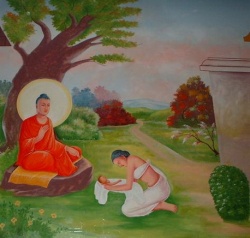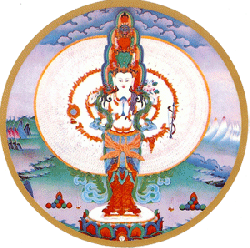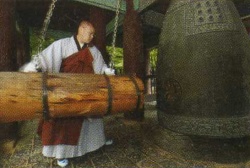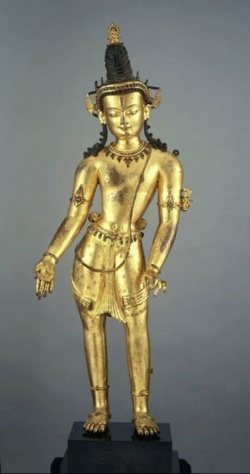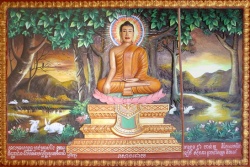Self-awareness
Keynote speech given at the
10th BLIA General Conference
Fo Guang Shan, Taiwan 2004
Greetings Distinguished Guests and Members of BLIA!
Today is the Tenth General Conference since the inauguration of the Buddha’s Light International Association. This is also the third such conference being held in Fo Guang Shan in Taiwan. I would like to thank each and every one of you for taking the time and making the effort in attending this conference.
I have been a monastic for sixty-six years, of which fifty five years have been spent on the introduction and propagation of Buddhism. Last year during the release of my photobiography “Cloud and Water,” someone asked me what the meaning of “Cloud and Water” is. Around the same time, someone else enquired why do I have to rush across the five continents so frequently? To these questions, I would answer, “White clouds flutter to and fro across the sky and rivers criss-cross the land unceasingly. Travelling monastics are like cloud and water, delivering them to the boundary of this world and eventually beyond the universe.” I concluded by saying that “Cloud and Water” in essence demonstrates the practice of the “Buddha’s Way.”
During the past decades, I have observed the rapid growth of Buddhism in Taiwan and other parts of the world. Accompanying the increasing number of devotees each year, people of diverse social backgrounds have actively participated in the propagation of Buddhism. In deed we should applaud this continual trend. However, through out the years, I am also aware that Buddhist practice seems to have stagnated on aspects of “Believing,” “Worshipping” and “Praying” to the Buddha. Many of our devotees have failed to see the need to apply the teachings of Buddha to our lives, which appears to be the main cause for the decline of Buddhism in the past. For example Buddhism teaches us to be compassionate, but how many Buddhists really practice compassion? Buddhism requires us to be generous, yet how many Buddhists are prepared to give joyously? Buddhism advocates prajna wisdom, but how many Buddhists can be regarded as enlightened persons possessing true wisdom? If practicing devotees do not observe the Dharma, it is no wonder that the quality of cultivation in the Buddhist fraternity is deteriorating.
In order to advance the quality of Buddhist belief, I have recently advocated the practice of the “Buddha’s Way” and designated 2004 as the “BLIA Year of Practicing the Buddha’s Way.” I hope that all of us can diligently apply our daily lives according to the His teachings. For example:
The Buddha taught us to be compassionate, thus we must avoid hurting or killing living beings.
The Buddha taught us to possess forbearance, thus we must refrain from being hateful or angry.
The Buddha taught us to establish good relationships with others, thus we must not be selfish or uncaring.
Only through the persistent adaptation of our lives in our faith and to lead our lives according to the Dharma can we begin to become self-enlightened and self-aware of how the Buddha led his own life. Only then can we appreciate the true meaning of the Dharma and its benefits to mankind. This year’s keynote speech is titled “Self-awareness and Practicing the Buddha’s Way” and includes four main topics that I hope you can adopt as goals for your future cultivations.
1. Personal Sublimation through Self-awareness
Since our birth, we have gone through various phases of receiving instruction and education. Up to a certain age, our parents at home would give us the necessary instructions. When we grow up and go to school, we are taught by our teachers. Finally when we start working, we will receive further education from the interaction with society. However I consider the most important form of education as one that is gained from maintaining constant self-awareness.
Self-Awareness is essentially a form of self education. According to the Buddhist sutras, we must be reliant on ourselves and the Dharma, but never depend on external influence. Similarly, we should teach ourselves to maintain alertness at all times so that we can assimilate and derive global understanding of all events around us. This is what I mean by self education.
One of the key methods in Buddhist cultivation is based on the proper use a self-aware mind. When the Buddha began his teachings, his intention was to lead us into a realm of awareness so that we are awakened to the Buddha’s insight and wisdom. Through this awareness, we can strive to become equals to the Buddha. Prince Siddhartha became the Buddha because he had realized the truth of life in the universe (self-awareness). With perfect compassion, he then proceeded to teach all being about this truth thus helping others to achieve enlightenment (enlighten others). Therefore, he is truly an enlightened person who possesses the quality of self-awareness, the ability to enlighten others, and complete enlightenment. The Buddha was named Sakyamuni because he wanted us to follow his lead. He wanted us to understand that the way to Buddhahood is by awakening to the real purpose of our own existence. A person cannot achieve complete enlightenment unless he possesses self-awareness and capable of enlightening others.
Education through self-awareness seems to originate from western societies. Under their system, young students are taught to think, identify and solve problems by themselves. The teachers are there to inspire and guide the students on carrying out research and completing assignments. The teachers would very often encourage their students to conduct their own lessons in class. Contrary to this, the Chinese teaching method continues to rely on an unhealthy force-fed approach. The teachers would stand in front of a class and teach without allowing the students to speak or interact. The students are contained and restrained, thereby gradually lose their instinct to self education.
By self education I mean the ability to be self demanding, self learned, self enriching and self reflecting without relying on others’ assistance. Successful self education is dependent on the constant questioning, awareness, motivating and understanding of the self. We can indeed discover our own self through self contemplation.
There are many ways to educate ourselves in Buddhism. These can be achieved through repentance, admission of wrongdoing, reflection, meditative thinking and self contemplation. Sometimes we can learn by listening, thinking and taking action. Sometimes we can learn by consulting and seeking advice from others. Sometimes we can learn through meditative thoughts. Sometimes we can learn through spontaneous understanding. There are those who are unable to study and learn alone. If you resolve to provide assistance, you will improve your own skills by teaching others. This is self education.
Self-education is most effective if we rely on ourself at all times. Let me tell you a story from the Ch’an Koan. A long time ago, Master Dao Chien and his good friend Master Zon Yuan travelled together on a study tour. They had journeyed long distances and Master ZongYuan was finding the trip extremely difficult and tiring. On many occasions, Master ZongYuan complained and demanded to end the journey. Master Dao Chien comforted him and said, “We have decided on this study tour. It is a shame to abandon our quest now since we have already covered so much ground. Will you continue if I promise to help you with whatever you ask of me? However, there are five tasks that I will not be cable to do for you.” Master Dao Chien asked, “What are these five tasks?” Dao Chien replied, “Putting on clothes, eating meals, urinating, defecating and walking.” In a way Dao Chien was suggesting that each person has to resolve his own basic necessities if he hopes to accomplish anything.
We can achieve success only if we rely on our own faith, awareness and enlightenment. There is always a limitation on how much assistance others can provide. Asking others to consume our meals cannot satisfy our hunger. We cannot reach our destination by asking others to walk on our behalf. We cannot transfer our suffering to others if we are sick. When we are tired, others’ resting will not rejuvenate our waning strength. Therefore we have to rely on our own cultivation and practice to achieve liberation and enlightenment. Master Zhao Zhou once said, “Even for such a simple task as going to the toilet, you have to do it on your own. Therefore how can you ask someone else to be responsible for your effort in becoming a Buddha?” We cannot be successful unless we can establish our expectation and determine the direction of our own cultivation.
The importance of self-awareness can be demonstrated from an extract of the Record of the Mirror of Orthodoxy (Zongjing lu), “Only the person who drinks can tell whether the water is hot or cold. Without regaining their eyesight, the blind cannot truly appreciate the true form of an elephant.” More than two and a half thousand years ago, the Buddha attained enlightenment under the Bodhi tree. The first words spoken by him were, “All sentient beings possess true Buddha nature!” Through his words, we know that all beings possess the potential to becoming Buddhas. Therefore men are equal to the Buddha but for the loss of their awareness, their suffering in the cycle of rebirth is prolonged. Our cultivation will help us to discover and become aware of our true nature once more.
Awareness is to observe, discover and reacquire, which is different from invention. Invention involves the creation of a new item or knowledge. To reacquire or discover is to become aware of an existing matter or phenomenon. For example, the famous British scientist Newton discovered earth’s gravitational force. This is a function of awareness. Even if Newton’s discovery did not happen, gravitational force still exists on this earth. When the Buddha attained enlightenment, he was only becoming aware of the truth of the law of Dependant Origination, but he did not create such a law.
Therefore, in the “Samyuktagama Sutra,” the Buddha taught that “It does not matter whether or not there are Buddhas in the worlds, Dharma is always existent and can be found in every corner of the universe. For those striving to attain enlightenment, they can do so through their own awareness of the Dharma.”
Mankind has been living on earth for millenniums, but why is it that no one ever discovered gravitational force before Newton? I believe that it is because Newton had a unique ability to observe. In Buddhist terms, Newton possessed a very high level of awareness, which is very important to the development of personal wisdom. Buddhism places a strong emphasis on the advancement of individual awareness; because only through progressive elevation of awareness can we develop and enhance our wisdom, which leads to the understanding and appreciation of nirvana.
A Pratyekabuddha is in the state of one of the four enlightened realms within the Ten Dharma Realms. Pratyekabuddhas existed before the birth of the Buddha and attained enlightenment without teachers, assistance from others or knowledge of the Dharma. Through his observation of the Twelve pratitya-samutpada (twelve links of Dependant Origination), he became aware of the meaning of Life. Maha Kasyapa, leader of the Buddha’s disciples once said proudly, “I can still attain enlightenment and become a sage without even meeting with Sakyamuni Buddha.”
In deed Maha Kasyapa possessed an extremely high level of awareness. When the Buddha gave a sermon on the Vulture Peak, He tested the audience by holding up a flower without uttering a word. With the exception of Maha Kasyapa, not one single person from the audience was able to comprehend the Buddha’s intention. On the other hand, Maha Kasyapa was able to establish a simultaneous bond with the Buddha, and returned with a smile from the bottom of his heart. The Buddha announced "Here is the Tathagata's Dharma-eye, profound Nirvanic mind, formless reality, profound and mystical Dharma, wordless doctrine, and the special transmission outside the orthodox teaching; now I transmit it to you Mahakasypa as my successor." At that moment, the Ch’an School in Buddhism was established through this rapport between the teacher and the student. This is another display of self-awareness.
In China, the Ch’an School always advocates “enlightenment through awareness.” All problems are to be solved by personally contemplation without disclosing the answers to others. Once Master Zhi Xian was stumped by his colleague Master Ling Yu when he was asked, “What was your responsibility before you were born?” When he asked for further explanation, Master Ling Yu answered, “This is my understanding and I need to say no more. Even if I provide additional clarification, I do not see how this can benefit you.” Master Zhi Xian then returned to the monastery, looked into every book in the library, and tried to formulate an appropriate response without success. At the end of the day, he sighed and said, “You cannot satiate your hunger by reciting the word ‘eat’ or looking at the drawing of a cake.” He then burned all his books and vowed, “From now on, I will not waste my time studying and researching on the sutras. I will be better off conducting myself as an ordinary monk.”
After bidding his leave with Master Ling Yu, he travelled to the tomb of Grand Master Hui Zhong and continued his practice. One day, whilst clearing overgrown weeds, his scythe hit some rubble on the ground. The reverberating sound suddenly provided him with the elusive answer and he found himself awakened to the truth. He recited the verse, “The sound of one strike overcomes the barrier of my past knowledge. I shall no longer rely on theoretical cultivations. In an instant I am awakened to the age old Truth. Realization comes without trace and does not rely on the display of external etiquette. Words uttered by the enlightened ones are words of complete wisdom.” Had Master Ling Yu decided to provide further explanation and clarification in the very beginning, Zhi Xian would not have been able to attain sudden enlightenment. The Sixth Patriarch of the Ch’an School said, “Profound insight cannot be taught. It is always close to you and revealed through contemplation.” If you do not recognize your own nature, you will not improve yourself no matter how hard you try to learn from others. It goes without saying that “Prized treasures are never given. They are found within your mind and inherent in your nature.”
Throughout our lives, we needed parental caring, instruction from our teachers, support from society, and assistance from our mentors and encouragement from our friends. However most important of all, we must rely on our own self-awareness. We must not lose our awareness and become totally dependent on others. Let us consider the blood that flows within our body. It provides natural nutrients to ensure health and our well-being. It is far better than any injection of vitamins or supplements that provide limited benefits. When we take refuge in the Triple Gem, we are really referring to the Intrinsic Triple Gem. We are seeking to discover and understand ourself. Man’s true nature is originally pure and unspoilt, but it loses its purity in a single ignorant thought and ends up with prolonged suffering in the bitter sea of rebirth. To rediscover ourself, we must place our faith and devotion to Buddhism. We must detach ourself from our polluted façade. We must understand and assess our current disposition with frankness, all of which cannot be attained by relying on others. We must depend on our own awareness to achieve our goals.
Awareness is the wisdom pre-requisite to the attainment of profound nirvana. Very often we have said that we are resolved to develop the Bodhi mind and we want to practice the ways of the Bodhisattvas. But do we truly understand the meaning of becoming a Bodhisattva? Chapter 4 of the Mahaprajnaparamita Sastra states, “One who has self-awareness and enlightens others is a true Bodhisattva.” If this merit is carried out to its fullness, then we are on the path to Buddhahood. The essential merits required to becoming a Buddha are derived from the practice of self-awareness, enlightening others and complete enlightenment. In other words, in the process of our cultivation, we shall use our awareness to guide our lives and to rely on this awareness to complete our journey to enlightenment. Based on our Bodhi mind and cultivation of the Bodhisattva path, we can travel on the road of awareness and enlightenment.
It is not difficult to develop our awareness if we are alert, and it will be relatively easy to identify examples of awareness and enlightenment. According to Confucius, “Each person should reflect three times on his daily deeds.” This is similar to Buddhism’s “From hence forth I repent each and every one of my wrong deeds.” They are the implementations of self-awareness. Master Pu Jue of the Sung dynasty once said, “If practitioners divert their criticism of other to themselves, their cultivation will improve immensely. It does not matter if you are happy or angry, peaceful or excited, every moment is the right moment to appraise yourself.” Every error committed needs to be identified and put right by the application of a self-aware mind. Scholar Liang Qi Chao once said, “I shall not be deterred from declaring war on yesterday’s ‘me’.” This is not unlike a famous Confucian saying, “Life is in a constant state of rejuvenation. Yesterday was rejuvenated. Every day is rejuvenated and tomorrow will be rejuvenated.” One of the preconditions of Buddhist monastic life is “to diligently cultivate precepts, concentration and wisdom; and to extinguish greed, anger and ignorance.” Therefore we can overcome greed, anger and ignorance if we are constantly aware of our dedication to precepts, concentration and wisdom. Such is the means and ways to improve our cultivated lives.
Self-awareness is a path taking us to ultimate liberation. To be able to say, “I know,” “I realise” or “I understand” is worth more than a thousand lectures conducted by others. We must never refrain from exercising our awareness and simply relying on others to solve our problem. The Sutra of Bequeathed Teachings says, “The fault is not with the instructor if the learner refuses to follow the teaching. The responsibility is not with the doctor who prescribed the right medication if the patient chooses not to take it.” Likewise, the “Diamond Sutra” expounds that “All forms are delusive and false” and “Those who seek me by form and plead to me in sound are perverted in their ways and cannot perceive the presence of the Tathagata.” You will deviate from the Path if you are attached to external influence. Only with proper recognition of your self-awareness can you reach the Buddha within your mind and discover your true nature. From this point forward, I hope that all members of the BLIA can utilize their awareness to elevate their intrinsic quality. At the same time, you should regularly study the sutras and attend sermons. By contemplating what you have learned and heard, you will gain wisdom. You should continue to apply yourself diligently to the understanding and application of Buddha’s teachings. Your wisdom will advance to the next level by the practical implementation of your self-awareness, thus assuring your enlightenment.
2. Local Adaptation of Buddhism Development
In line with the rapid progress made in information communication and modern transportation, the whole world is advancing towards globalization in many areas. We are witnessing the transformation of this world into a “Global Village.” However, the subject of “local adaptation” has never ceased to play a vital role in the history of this world. A good example is the recent heated debate that took place in the Taiwanese political arena.
In reality, Buddhism recognizes that there are thirty three levels of heavens. The Samsara is also comprised of three realms, namely; the six heavens of the Desire Realm, the eighteen heavens of the Form Realm and the six heavens of the Formless Realm. We can also find from the Buddhist Canon that there are Eastern and Western Purelands. It is an indisputable fact that we have in this world many different countries and ethnic races. The deepest imbued fear of these countries and races is the possibility of being invaded and conquered; and ultimately the loss of their cultures.
I was on a world propagation tour some time ago and was invited to give a lecture at the Cornel University in the United States. After the lecture, Professor John McCleay said to me, “You are welcome to propagate the Dharma in the USA. But it seems that you have repeatedly tried to impose your Chinese culture on the Americans; as if you are trying to subjugate the American culture.” When I heard what he said, it became apparent to me that I have been insensitive to their local cultures. I was reminded that the purpose of my visit is to contribute and serve, just as Buddhist devotees make offerings of flower to the Bodhisattvas. Therefore we must respect the cultures of other countries and societies; and to accept the unique characteristics of these cultures. We learn from the sutras that the Eastern Pureland has it own characteristics which are different from the special features of the Western Pureland. Similarly, there are differences between practicing in secluded monasteries and practicing Humanistic Buddhism in society. To be able to share and co-exist irrespective of different cultures will ensure a more colourful and attractive world.
Buddhism was first transmitted from India into China. In the beginning Indian monks travelled to China for the sole purpose of translating sutras into the Chinese language. The responsibility of building monasteries and temples rested with the Chinese monastics. That is why Buddhism in China flourished with Chinese cultures. On the other hand, if these Indian monastics like Kasyapa Matanga, Dharmaraksa decided to reside permanently in China and participated in temple building and Dharma propagation, Buddhism in China would have retained a lot more of Indian influence. Have you ever wondered why when the first Patriarch of the Ch’an School, Master Bodhidharma, appointed Master Hui Ke as the second Patriarch instead of choosing someone of Indian descent? It is because Master Bodhidharma was aware of the importance of ensuring his teachings could be adapted locally. Similarly, many years ago I have transferred the Abbotship of Fo Guang Shan to Venerable Hsin Ping because he was a native born Taiwanese. That is an example of my objective of local adaptation.
The local adaptation that I am advocating is benevolent, friendly, harmonious and enhancing. It does not involve rejection or denial. For example, when participating in the 4th of July Day parades, I had noticed that most Chinese Americans despite having lived in the US for many years still regarded themselves as Chinese first and American second. Therefore, I would like to encourage our BLIA members, when taking part in the 4th July Day parade to proclaim publicly that “I am American.” Since we have chosen to live in the United States, we should recognize ourselves as part of the new home. It would not be right to segregate ourselves in another country.
It is natural to expect an exchange of cultures. However, if we think carefully, we would not like to find a United States of America or the Japanese Empire embedded in the middle of the Republic of China. I would suggest that all aspiring immigrants, no matter where you are going, you should be prepared to settle down and embrace wholeheartedly your new country. You should adapt to the local environment, cultures and way of life. You should never try to purposefully cling onto your old background and customs and create tiny enclaves within another nation.
In the past, no matter where they went or what they did; Chinese immigrants always carried with them the desire and slogan of “To popularize and preserve the Chinese cultures.” This is patently wrong because each place has it own unique culture and history. Europe has its own European culture. America has its own American culture. Australia has it own Australian culture. It is of most importance that we must respect these local cultures. It may be acceptable to introduce Chinese and other cultures into another country. But we must never attempt to use our Chinese culture to subjugate or replace other’s cultures. For members who came from different parts of the world, successful propagation of Buddhism is dependent on how well we can adapt our works to the local needs and cultures.
In the course of propagating Buddhism that started almost twenty five hundred years ago, the fundamental nature, principles, rules and instructions of the Dharma have never changed. However when Buddhism was transmitted to China, Japan and Korea, it became Northern Buddhism. When Buddhism was transmitted to Sri Lanka, Burma and Thailand it became Southern Buddhism. Similarly when it was transmitted to Xinjiang, Tibet and Mongolia, it became Esoteric Buddhism. Each of these forms of Buddhism has evolved into its current state through the gradual influence of the local climates, geographic conditions, customs, needs and traditions. It is a clear example of conforming to and complying with the local environments. A catholic priest, Father Ding Song Jun once said to me, “If you were born in the West, you would probably be ordained as a priest. If I was raised in the East, I might be a Buddhist monk now.” For example, in a country with abundant timber, you will find that the people will use a lot of timber furniture. Similarly in a land with a large supply of stone quarries, you will find popular use of stone products. Therefore it is clear adaptation of the most appropriate conditions and resources. It has nothing to do with being right or wrong.
Our discussion today is about local adaptation to promote Buddhism. Buddhism is not a tool to overcome the cultures of other countries. Its goal is to promote unity, co-existence, co-operation, mutual survival and achievement. The BLIA is an organization advancing the principle of Humanistic Buddhism. Wherever we are in this world, we have the duty to develop Buddhism in the area. However, we must always be aware of the different characteristics of the area, and realistically adapting ourselves to the local requirements. So long as the principles of the Dharma are not altered, we should emphasize and promote the retention of the local cultures and needs. Both the United States and China are large countries. We know that the United States has a Federal Government system; it is also governed by 51 different states governments. Similarly, China has a central government that oversees 36 provincial governments, Self Administrative Zones, Special Economic Zones and Minority Ethnic Zones. They are all good examples of exercising the principle of local adaptation.
In March 2004, the BLIA and Buddhist Communities in China co-organized the “Chines Buddhist Musical Concert.” The performances were held at the National Dr. Sun Yat-sen Memorial Hall in Taiwan, Los Angeles Kodak Theatre and Royal Canadian Opera House. The programmes were performed by over one hundred sangha of the Mahayana, Esoteric and Theravada orders coming from eight famous temples from both sides of the Taiwan Strait. The performers might come from different backgrounds, but this only enhanced and emphasised their individuality. The chanting was both clear and wonderful.
The above demonstrates that Buddhism may exist in many forms such as North, South and Esoteric schools. It must be recognized that these different forms of Buddhism all possess their own special features and characteristics. But it is unnecessary to change these characteristics even though they may differ in language, music and apparels. To be successful in the international development of Buddhism, we must ensure the rigorous implementation of the principle of local adaptation.
During the 3rd BLIA Directors Conference held in Johannesburg South Africa in 19 April 2001, I had proposed the “Four Transformations” in the agenda. They are as follows:
(i) “To humanize Buddhism”
(ii) “To culturally improve our lives”
(iii) “To install equality in the monastic and lay societies” and,
(iv) “To promote local adaptation of monastic establishments”
When I proposed “local adaptation of monastic establishments,” I am referring to the hundreds of temples and Buddhist centres founded and operated by Fo Guang Shan and BLIA. Their ownerships belong to the community and not by individuals. In fact I ask all BLIA members to make a common vow, aiming to implement adaptation of all these establishments to local cultures and conditions in the next twenty to thirty years time.
At the conference, I had suggested to the audience to visualize what a spectacular achievement for Buddhism it will be if we are able to install to all of the overseas temples abbots or abbess of native origin. Imagine we have an American Abbot at the Hsi Lai Temple, Australian Abbess at the Nan Tien and Chung Tien Temples and African Abbot at the Nan Hua Temple.
It is my sincerest wish, in the coming twenty to fifty years, to be able to assist and guide the native monastics to become responsible for the management and administration of these overseas establishments. Nowadays the Fo Guang Shan Buddhist College is regularly receiving many applications from overseas. I hope that BLIA can attract more members of all ethnic backgrounds so that light of the Buddha and his teachings can be found in every corner of the world. I believe that this is the best way of how to conduct ourselves in the “Ways of the Buddha.”
3. Improved Income from New Buddhist Enterprises
We need either a legitimate job or business to be able to lead a proper life. Our wealth, comfort and stability are the result of daily hard work, which allow us to be able to perform good and benevolent tasks for others. One cannot be expected to carry out significant charitable deeds if he himself is poor and starving.
It is essential to satisfy our daily needs for clothing, food, lodging and transportation. Even if you are a perfectly enlightened Buddha, your daily livelihood is what needs to keep you alive in this world. In your Buddhist cultivation, it is not necessary to maintain a poverty-stricken and austere lifestyle. In fact, Buddhism encourages its devotees to be prosperous by being successful businesspersons or industrious employees. According to the Maharatnakuta Sutra, “Lay Devotees can amass wealth legitimately. It does not contravene the Dharma.” By being well off and self sufficient, we will be able to provide for our families, help our relatives and friends in need; and support the propagation of Buddhism.
Putting it another way, we must conduct our lives by right action and right livelihood according to the Eightfold Noble Path. The Samyuktagama sutra indicates that Buddhism acknowledges that proper livelihood can be made from taking part in various lawful professions such as farming, a herding, a trading or investing.
In Buddhism, right action is to conduct oneself in a correct manner. To have a right livelihood is to depend on some appropriate profession, business or employment for your livelihood. According to the Yogacara-Bhumi Sastra, “Right livelihood can be defined as the pursuit of clothing, food and miscellaneous items by proper means.” Buddhism does not discourage the cumulation of wealth by its devotees. A country grows stronger because its people are well fed and affluent. Likewise, propagation of Buddhism will become more successful if its devotees’ economic status is thriving and prosperous. Therefore, so long as your action does not harm other members of society, there is nothing wrong with your involvement in successful economic ventures.
It is regrettable that in the past, a number of patriarchs and sages had set some very harsh standards for their followers. They suggested that “Wealth is a horrible thing, it is like a serpent.” Others would suggest that “Couples married because they were enemies in their past lives.” They would even refer to children as debt collectors from the past. According to them, everything in this world relates to pain and suffering. They are not aware that their method of teaching is contrary to normal human nature; and their method of salvation will never appeal to the spiritual needs of the people. It is no wonder that they could never attract new devotees to Buddhism.
In the past, Buddhism has been misconstrued as advocating emptiness in our spiritual lives, relegating our physical needs as of secondary importance. However, according to the Amitabha Sutra, to reside in the Western Pureland to have your every wish granted. Its land and buildings are well endowed with gold and other treasured objects. Everywhere you go, you will meet up with Bodhisattvas wearing jewelled crowns and well adorned robes. It is indeed a grand and majestic world.
What I do not understand is that, up until now, there are many devotees maintaining the notion that you have to lead an austere life to become a good Buddhist. With this idea in their mindsy are prepared to be impoverished in this life in exchange for the possibility of leading a better life after death. This kind of thinking had created unsurmountable obstacles in the propagation of Buddhism in the past.
Many years ago on my visit to a number of European museums, I remember seeing many Catholic Churches. They are all majestic and glittering building, a clear demonstration of the Church’s power and wealth in the world. Similarly churches and banks in Taiwan usually occupy the best locations in towns and cities. On reflection, a few decades ago, Buddhist temples could only be found at the end of some dirty and obscure laneways.
In principle, Humanistic Buddhism advocates that we should have good living and lead a comfortable life without feeling guilty. Buddhism does not require its devotees to be poor or refrain from enjoying proper pleasures. It encourages us to earn our living by proper means. It encourages us to enjoy as much spiritual and physical pleasures as we can. Even though there are limitations to physical wealth and enjoyment, nevertheless we are in a better position to appreciate the Dharma joy with the help of these limited achievements. Without being hampered by material hardships, we are in a better position to harvest both spiritual and physical wealth in our lifetime.
Buddhism was transmitted from India into China, Korea and Japanese many centuries ago. One of the main reasons why it is so popularly accepted is that it strongly emphasized the need to assist the economic livelihood of its devotees. Functions of Buddhist institutions are not limited to teaching and preaching, they are also used as religious, cultural, arts and education centres. These functions are usually associated with other community functions such farming productions, general economies and social welfares.
Traditionally monastic buildings are built to a very high standard of graceful and palatial features. Their constructions of grand halls, pavilions, landscape gardens and imposing courtyards have earned them a reputation of being the “Buddhist Pureland.” In effect, Buddhist Pureland is the description applied to a pure, tranquil and sublime world. It is a world of peace and tranquillity. Although Buddhism discourages excessive physical indulgence, it also recognizes the benefit of reasonable and appropriate physical wealth and pleasure. Buddhism may not place an absolute importance in wealth accumulation, but we must accept the fact that money is needed for the purchase and installation of adornments for the temples. People usually visit and pray in the temples because they are magnificent and grand. People usually will not pay respect to the Buddha images unless they are gracefully decorated. We devotees have vowed to be reborn in the Western Pureland because we are told about its golden ground, jewelled pavilions and majestic buildings.
Buddhism may place merits on the ability to lead a plain and simple life, however it has to have sufficient infrastructures and facilities to accommodate the public and its devotees. A famous Chinese Poet Du Fu once wrote in one of his poems, “To build many houses so that the masses can be happily sheltered from the cold.” The monastics are required to lead a simple life owning only the bare essentials in clothing and other personal possessions. On the other hand, lay devotees should be provided with a fresh approach to their view of life. “Even a clever housewife cannot provide boiled rice from an empty pot” and “A poor couple finds no pleasure in life.” These approximate interpretations of old Chinese proverbs stress the fact that personal cultivation will not progress smoothly unless you are financially sufficient. Without money, you will not be able to care for your parents. Without money, you cannot provide for your family. Without money you will not be able to financially support the temple and carry out charitable deeds. Therefore it is not unreasonable to say that every aspect in our lives evolves around money. A country needs to have a plentiful treasury before it can implement its policies and programmes. To be able to provide spiritual needs, medical, charitable, educational and cultural services, Buddhist establishments require a substantial input of properly acquired wealth. Therefore, Buddhism does not reject assets which are obtained through proper means which are needed to purify and benefit the society.
“To Resolve” is a frequently used term in Buddhism. A lay devotee may determine to strive for fame and fortune in society; and start a family life. This resolve is acceptable by Buddhism. According to the Vimalakīrti-nirdeśa Sūtra, Vimalakīrti observed the Dharma diligently. At the same time he was a successful businessman involved in trading, farming and other businesses. Possession of money and wealth did not appear to hamper his devotion. In fact he made good use of his wealth to deliver others from sufferings. With the help of money, he was able to transform the world into a land of purity.
The duality of the Buddhist community ensures the complimentary existence of the monastic and layman groups. Master Vimalakīrti had been successful both as a layman and a Buddhist devotee. Clearly there is no conflict in making a comfortable living and at the same time cultivate your faith. It also demonstrates that possession of sufficient financial support is a prerequisite to the turning of the Dharma Wheel.
In this modern society, we can observe that financial groups have their group assets, individuals have their personal assets, political parties have their party assets, and religious groups have their own assets. During the undertaking of an enterprise, we should not regard profit as the only consideration. There is also a need to put in place a robust organizational structure, skilful use of human resources, and clear managerial and developmental strategies. As Buddhist practitioners, we should regard the propagation of Buddhism as our lifetime objective so that “Dharma propagation is my family goal and benefiting others is my career.” Profit making may not be the primary objective in the propagation by the monastics. But this does not mean that we have to reject the significance and contribution made by a profitable Buddhist enterprise. We know that Humanistic Buddhism is the “Application of spiritual belief in our daily lives.” It is especially focused on ensuring the happiness of the devotees. Therefore with its active development and implementation of cultural, educational and charitable activities, Fo Guang Shan is acting according to the principle of “Following the Buddha’s Path.” In the past, Buddhism placed great emphasis on Dharma learning and cultivation; and have neglected the necessity of business acumens. However I consider both matters of equal importance. Whereas the “forest” monastics can continue to improve their practice in seclusion, the “Humanistic” monastics can promote and propagate Buddhism through public speeches and publication of books and literatures.
Moreover, lay devotees can assist with the development of BLIA ventures by participating in running of BLIA teahouses, cultural shops, vegetarian restaurants, tourist agencies and other consultancies. All of the above establishments allow us to create new and genial relationships with the general public. To help improve the quality of life, we may also be involved in setting up factories, farms, power and utilities, department stores, hotels, insurance firms, newspapers, radio and television stations. With the arrival of global information technology, there is also a need to further develop electronic and Internet access to Buddhism.
In the past, temples and monasteries provided landscaped areas for visitors’ relaxation. We can perhaps expand this concept and develop tourist areas promoting Buddhist themes. Nowadays, the “user pay” concept is an accepted fact of the society. It is obligatory to pay entry fees when visiting museums and landmark areas. Therefore it would not be unreasonable to place a realistic upkeep fee for entry into future Buddhist museums, exhibitions and theme parks. However, visitation to temples for Dharma services and praying must remain free to all. Of course, the devotees may on their own accord make the appropriate donations to the temples. Currently there is no clear demarcation between entry fee and donation in China, Korea and Japan, and I can see that there is an urgent need to review these situations.
Today, you are expected to pay when attending Buddhist schools and hospitals. This is no different from the past when charges are levied on temple owned farm lands and houses. Historically temples had own and operated moneylenders, setting the precedence for the establishment of banking facilities by the temple for the convenience of the devotees.
In older days when organized economy was still in its infancy, the temples would often release its funds to help relieve financial difficulties of their devotees. There are recorded examples during the various dynasties where the temples provided invaluable assistance to the governments to relieve famines and other disasters. It also recorded that throughout the ages; Buddhist temples were involved in activities relating to food production, accommodation, stationary products, education, charities, medications, hospitals, disaster reliefs, funeral services, bathhouses and infrastructure constructions. All these activities were considered invaluable to the national prosperity and benevolence to the population.
Economy is the life blood of people’s livelihood. In India during the time of Sakyamuni Buddha, the monastic income was derived from a system of alms giving. When Buddhism was transmitted to China, succeeding generations of the Ch’an School promoted farming and forestry production. More recently Master Tai Xu advocated the combined working of Ch’an and manufacturing industries. Nowadays we are seeing the setting up of organized foundation funds. What I envisage for the future is an amalgamation of the ancient alms system, farming, industrial and modern economic enterprises. Orchards and vegetable gardens, timber forests, rental housing and farm land, factory productions, Buddhist publishers, Buddhist arts and crafts, regular service donations, special and funeral services, café and vegetarian food outlets, promotion of social activities, sponsorship of Dharma propagation, entry fees to special events or exhibitions, charitable services, meditation and accommodation, cooperative funds, and special support committees are all inevitable trends of modern day economic development by Buddhist society.
In summary, Buddhism recognizes wealth as a neutral commodity; it is neither good nor bad. Buddhism does not totally negate the benefit of material wealth. Money may be a serpent, but it can be turned into good use to sustain the propagation and cultivation of the Dharma. It should be regarded as the basic necessity for the development of Buddhism. Buddhist colleges, meditation and recitation halls, schools, hospitals, radio and television stations and magazine publishing all require money for their operations. Therefore money is not necessarily a serpent. According to the sutras, there are “clean wealth,” “good riches” and “saintly treasures.” As long as it can be put into proper use to promote the Dharma and benefit other beings, it is more meritorious than trying to practice under the pretence of austerity. Well used wealth is in fact more meaningful and wise. As a result it is necessary to re-evaluate the importance of economic development in Buddhism. As long as the principle of right action and right livelihood is adhered to, I can see no problem in trying to be profitable in our enterprises. I believe every devotee should not feel ashamed just because we are wealthy; so long as the money is used for our personal happiness; and for the benefit of the people, society and nation. On the other hand, poverty will often attract foulness and crime.
From now on, I hope that members of the BLIA should resolve to engage themselves in new and successful Buddhist ventures to enhance our economic standings. This will allow better opportunities to implement the ideals of Humanistic Buddhism of establishing a stately and dignified Pureland in this mundane world.
4. Dedicate Our Vows in the Practice of the Buddha’s Way
Before we start any task, we must set ourselves a goal. Once a goal is set, we will be able to identify a direction in which we can apply our energy and effort. To set a goal is to “make a resolution’ or in Buddhist terms “to resolve and make a vow.”
Normally, the level of personal achievement in society is determined by our childhood aspirations. In Buddhism the level of our cultivation achievable by a devotee is determined by the intensity of his vows. According to all the sutras, all the Bodhisattvas achieved enlightenment through the power of their vows. There is not one single Bodhisattva who was enlightened without first making great vows. The Sutra of Infinite Life refers to the forty eight great vows made by Amitabha Buddha. The Healing-Master’s Seven Buddhas Wish-Fulfilling Sutra refers to the twelves vows undertaken by the Healing Buddha to relieve beings of their sufferings. Chapter 7 of Karuna-pundarika-sutra refers to the five hundred great vows of the Sakyamuni Buddha. The ten good vows practised by Maitreya Bodhisattva is transcribed in the Maitreyapariprccha Sutra. The “Medicine Sutra “ also records that the Medicine Tathagatha made the twelve great vows to eradicate sickness and sufferings of all beings. There are many other examples such as the eighteen great vows of Manjusri Bodhisattva, the eighteen great vows of Samantabhadra Bodhisattva, the ten great vows of Avalokiteśvara Bodhisattva and the great vow undertaken by Ksitigarbha Bodhisattva to liberate all beings from hell before considering becoming a Buddha. The above is just a few illustrations of the great vows undertaken and carried out by the Buddhas and Bodhisattvas.
Throughout history, many monastics, sages and virtuous lay persons had vowed to “Perpetuate the Dharma existence and to liberate all beings from sufferings.” Master Xuan Zang successfully completed his vow of travelling to India and returning with the sutras after vowing to “Rather die by taking a single step towards the West than returning to the East empty handed.” Master Jian Zhen delivered the Dharma to Japan as a result of his vow of “Death is of insignificance when compared against a Great Mission.” More recently Venerable Tzu Hang said “I vow resolutely to learn and follow the most supreme teachings, not for my own enlightenment to be a Bodhisattva or even a Buddha, but to allow all the being in the Dharma realm to be enlightened with complete wisdom.” They are all role models that Buddhist devotees should follow.
To resolve to a great vow is fundamental to becoming a good Buddhist. Our resolve will strengthen our confidence and determination. It can intensify our bodhi mind and elevate our faith. It will enhance our morality and integrity. Therefore we should resolve to take appropriate vows as part of our daily practice. For example, I vow to care for my parents and to be cordial with my neighbours. I vow to offer my service for the society. I vow to sacrifice myself for the good of the community. I vow to promote World peace so that all people can live in harmony. I vow to a bridge so that people can safely cross the stream. I vow to be a tree offering coolness in the summer heat. I vow to be a drop of water to nourishing the parched land. I vow to be the sun and moon shedding lights on everyone. I vow to be a breeze giving comfort to all beings. I vow to be kind and considerate so that each of us can be carefree. I vow to a flower bringing beauty to the world. I vow to be the rivers and the mountains providing landscapes for admiration. I vow to be a cool fresh stream to quench the thirsty travellers …..
To vow is like winding up a clock or filling a car with fuel, providing the energy to move forward. To vow is like a ship’s compass or a student’s daily diary, providing a goal for our lives. To vow is the very first thing we should learn from Buddhism. The Treatise on the Advancement of Enlightenment states, “The first and foremost key to Buddhism is to resolve and vow. All beings can be liberated if they are resolute with their vows. Enlightenment is achievable if vows are implemented with determination.” Chapter 7 of the Mahāprajñāpāramitā Sāstra says, “To practice without a vow is an aimless gesture. A vow is your guidance to enlightenment. It is similar to an apprentice who must work under the direction of a master goldsmith to be able to craft the gold into a particular design.” “To propagate Buddhism is a solemn duty which cannot be accomplished without proper resolve. It is like an ox pulling a cart, which will not reach its destiny without a driver.”
In addition, the Mahāsamnipata Sūtra teaches, “Vowing can destroy all evil hindrances.” The Bodhi Mind Resolve Sastra says, “Our bodhi resolve must be aroused with the greatest of determination. Once our vows are initiated, we must implement them with due care, diligence and purpose.” From the above, it is clear that the way to the Buddha’s path starts with our vows. It is true that our action or “cause” leads to “effect.” However without a direction or a “vow,” all our actions will be without direction or meaning. Therefore our resolve on vows set up and motivates all our cultivations.
To resolve and to vow is usually associated with Buddhist practices. However, to resolve and to vow is not a Buddhist monopoly. In fact everyone in the society needs to establish goals by vows and determination in order to be able to complete our tasks to the best of our abilities. A resolve or vow is a continual source of energy and asset that are found within ourselves. The Treatise on the Advancement of Enlightenment says, “Diamond’s hardness cannot be compared with the strength of our vows. Immensity of the universal is tiny when compared with the consciousness of our mind.” Our achievement is dependent on the vastness within our conscious mind and our strength is derived from the determination of our resolve. Therefore the way to Buddhahood will not be denied to us if we can be resolute with our vows.
Just like attending classes, the quality of our vows will improve with time. Initially we start with a vow of small significance. In time, we will learn to elevate the intensity of our vows. During my life time, I can vow to recite many sutras, to carry out good deeds for the benefit of the people, and make Buddhism known to the people. I can resolve to be a supporter of the temple, to be servants to all beings, a provider to the family and an outstanding example of the society. To be able to resolve to follow the “Buddha’s Way” and to do what the Buddha had done is true wonderful.
When we talk about the “Buddha’s Way,” I remember Mr. Cao Zhong Zhi, the founder of “Life Line.” Mrs. Cao is a devoted Buddhist. Forty years ago, she had taken the refuge at Pumen Retreat. She was completely captivated by my concept of Humanistic Pureland. Since then she had constantly persuaded her husband to visit the temples and listen to sermons and preachings. At the time Mr. Cao was not a Buddhist, but followed Mrs. Cao’s wishes out of love for his wife.
At the end of a particular service, Mrs. Cao took her husband’s hand, walked in front of me and said “Master, will you please enlighten my husband so that he will believe in Buddhism and teach him how to pray to the Buddha?”
At that instance, Mr. Cao was totally embarrassed. To ease the awkward situation, I said “It is not necessary for Mr. Cao to practice the rituals of Buddhism so long as he is conducting himself in the “Buddha’s Way.””
Mr. Cao was delighted when he heard what I said. Afterwards, he would say to everyone he met that “Master Hsing Yun advised me that I do not have to perform the customary Buddhist rituals so long as I am applying myself to the “Buddha’s Way.”
Ever since that meeting, Mr. Cao has untiringly participated in many charitable and benevolent social works. For example, he has founded the “Life Line” in Taiwan helping the destitute and impoverished to a better life. He has established the Cao’s Foundation Fund to provide education subsidies to needy students. He has also organised to supply wheel chairs to tens of thousands of handicapped persons. Each year he would donate millions of dollars to diaster appeals. In addition, he is a passionate supporter of Fo Guang Shan and BLIA providing valuable contributions to the establishment of Dharma centres and religious activities. He has also given generously to the setting up of multi-language plaques around sacred sites in India and Sri Lanka commemorating historic Buddhist events.
Many would congratulate him for his good deeds but he would invariably reply “To recite sutras is good, but it is not as good as listening to sermons. To listen to sermons is good, but it is not as beneficial as to preach. However, the best deed of all is to implement Buddha’s words. I am merely conducting myself in the Buddha’s Way.”
To act in the “Buddha’s Way” is to follow and implement the teachings of the Buddha. Every day we greet our fellow devotees as “Practitioners.” That is we are the practising the Dharma. A true practitioner is one who does not just listens and learns, but to put into action what the Buddha had said and done in His life time.
Every sutra always starts with the words “Thus have I heard” and ending with “Faithfully believed and put into practice.” To be able to faithfully believe and put into practice the Dharma is in reality to actively apply ourselves in accordance with the ways of the Buddha. Therefore the fundamental objective of a devotee is to implement the following “Buddha’s Ways”:
1. To be compassionate and generous is the Buddha’s Way
2. To be charitable and benevolent is the Buddha’s Way
3. To serve the society is the Buddha’s Way
4. To be moral and ethical is the Buddha’s Way
5. To preserve personal integrity is the Buddha’s Way
6. To observe the precepts is the Buddha’s Way
7. To be respectful and magnanimous is the Buddha’s Way
8. To carry out good deeds is the Buddha’s Way
9. To be repentant and grateful is the Buddha’s Way
10. To tolerate losses and injustice is the Buddha’s Way
11. To be forbearing and complying is the Buddha’s Way
12. To believe in the faith is the Buddha’s Way
13. To progress with the time is the Buddha’s Way
14. To be an integral part of the Dharma Realm is the Buddha’s Way
15. To Integrate and co-exist with all beings is the Buddha’s Way
16. To apply Buddhism to the world is the Buddha’s Way
The Buddha once said “the mind, Buddha and all beings are all equals.” The Buddha is an enlightened being. All beings are future Buddhas waiting to be enlightened. The Buddha has completed His enlightenment with no further need to revisit the Samsara. Conversely all beings have yet to achieve their enlightenment and remained in the rebirth cycles. If we do what the Buddha did, we can be assured of being released from the sufferings and awaken to the joy of enlightenment.
To be successful in the Buddhist practice, we must be able to place equal importance on the understanding and application of the Dharma. To practice without true understanding will lead you along a path of illusions. However to practice solely on belief and understanding is also insufficient because you are biased towards the theoretical aspect of Buddhism without reaping the full benefit of this great religion. A wise practitioner is able to place equal importance on understanding and physical application of the doctrine. To understand is to have faith and to apply is to practice the “Buddha’s Way.” To understand wisely is to be able to be self-aware. To apply ourselves to the Buddha’s Way is to help others to become awakened. Since we consider ourselves as Buddhists and are resolved to cultivate ourselves, we must make sure that we live our lives according to the Dharma. By appropriate praises to others we are following Buddha’s bidding on generosity of kind speeches. To be constantly conscious of the unique relationships between self and others, we will become aware of the oneness existence of all beings. To serve untiringly helps both the public as well yourself. You are actually benefiting yourself if you are grateful and respectful to others.
Ever since the Ming and Qing dynasties, many devoted practitioners had been able to provide comprehensive knowledge and explanation on the Dharma. They were able to talk about the profound and discuss with great proficiency about spirituality. Unfortunately, not many of these learned persons managed to practically apply their theories to their lives. It is difficult to expect consistency of words and actions if you have not actually experienced what you taught. Take for instance when you are reciting the Buddha’s name, are you able to maintain complete dedication in your recitation? Similarly, when you meditate, have you reached the state of samadhi concentration? When you are praying, are you aware of the improvement of your personal attributes? During chanting, do you derive great admiration and faith in the Dharma? When faced with obstructions in the course of your various practices, do you have the necessary strength and forbearance to overcome these obstacles? Therefore it is more fitting to take a simple step rather than to boast about the distant mile. All of the above illustrates the importance of self-awareness and the “Buddha’s Way.”
In closing, I would like to emphasis again that self-awareness is a means of self development whereas enlightenment of others is the way of the Buddha. To have self-awareness and the resolve to practice the “Buddha’s Way” is proof of our co-existence with the Buddha. If a person possesses the Buddha’s Nature, what he sees is Buddha’s world, what he hear is Buddha’s sounds, what he smell is Buddha’s fragrance, what he speak is Buddha’s speeches and what he does is Buddha’s deeds. If everyone possesses these profound qualities, we will be living in a world of Buddhas. How can a family not be blessed and happy? How can a society not be safe and secure? How can a nation not be strong and prosperous?
Finally, from now on, let each of us make a solemn vow and say to ourselves that “I am a Buddha.”

